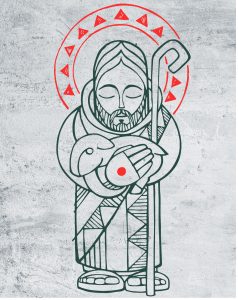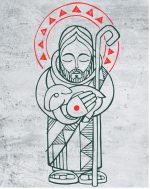A Reflection from the Christian Tradition:
 stock.adobe.com
stock.adobe.com
A Reflection for These Final Days of Easter
My Sheep Know My Voice
One of the most beautiful and powerful images of the Easter season is the Good Shepherd (John 10). In those lovely verses, the Gospel writer presents an image of Jesus that has inspired artists, poets, and farmers throughout the centuries. Jesus is portrayed as an endearing Shepherd who “loves” the sheep placed under his care. One wonders if Jesus possessed any practical business skills. The farming endeavors are not situations where one adopts the inventory as pets. For too long, the imagery of the Good Shepherd has been romanticized as if Jesus was simply displaying what it means to be meek and mild. The text and its fierce imagery must be retrieved since the implied teaching is crucial to our following of Jesus.
We must resist the temptation to think that we are the sheep in the flock of Jesus. We are called to be like the Good Shepherd in the flock of our neighbors, friends, families, and associates. We are invited to hear the voice of others and call them by name. In this day and age, when powerful people think they gain popularity by calling people names, the teaching and example of Jesus serve as a necessary corrective. How we speak to and about others Is, in itself, an act of justice. This does not mean we never correct or confront anyone. Justice demands we stand up for what is right by exemplifying the respect others deserve.
Jesus stuns the industrialization of the farming community in the reversing of crucial roles. Instead of the sheep dying for the profit and well-being of shepherds, the Good Shephard is willing to die for the sake of the flock.
I cannot help but think of our brothers and sisters in the meatpacking industry. Governmental officials are demanding they risk their lives that we might eat. Suddenly the imagery of John’s Good Shepherd is bleeding. These men and women are often struggling to exist, immigrants seeking security, hardworking people who put their families first. They have been called names, demeaned, and marginalized so powerful people can make money at the expense of their slaughter.
We must come to their rescue. We must call them by name. We must cherish their lives and not devour their flesh by thinking we have no power, no voice, no right to confront. The slogan says we are in this together. We might modify what we eat. We might make sure the weaker among us are secured and assured. We might bond with the management of owners of local grocery stores and outlets to see how we may be of help to the men, women, and children who produce our food. How could we eat and not remember Jesus? And, if we do remember Jesus, how can we ever forget those for whom he died?
We have now come to the realization that essential workers are not necessarily people of status, wealth, or power. They are often hungry, worried, scorned, hurt, and insulted. Thank you for being a Good Shepherd when you shop, consume, and share. Let your voice be heard so those threatened by the greed of the foolish will not be slaughtered on the altar of profit, ego, and indifference. Remember Jesus in every morsel you eat and give thanks with the generous self-giving of yourselves.


Off